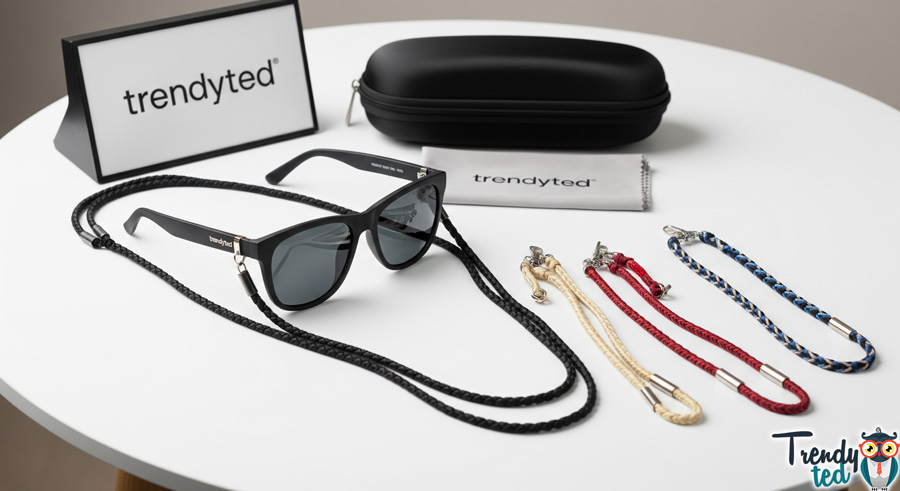Properly Cleaning Your Glasses
Use a Microfiber Cloth

Cleaning sunglasses requires care and the right tools to avoid damaging scratch-resistant lenses. A microfiber cloth, with its soft and fine texture, is the best choice for wiping lenses as it prevents scratching the sensitive surface. Using paper towels, regular cloths, or the corner of your shirt can introduce abrasive particles that damage lens coatings, such as anti-UV or anti-reflective layers. To maintain the quality of your high-quality sunglasses, wash the microfiber cloth regularly with mild soap and water to remove dust and grease, and always keep a clean cloth in your protective case.
The Right Cleaning Solution
Choosing the right lens cleaner is essential for extending the life of your sunglasses. Specialized lens cleaning solutions or a mixture of lukewarm water with a few drops of mild dish soap are ideal options that remove grease and smudges without harming the lenses. Avoid harsh chemicals like alcohol, ammonia, or glass cleaner, as these can strip away protective coatings like anti-UV or anti-reflective layers. To clean, spray the solution onto the lenses and then wipe them with a microfiber cloth in soft, circular motions to prevent any potential scratches.
Storing in a Protective Case
Choose a Hard Case
One of the most important steps in caring for your sunglasses is using a hard protective case. These cases, with their durable structure, protect the frame and scratch-resistant lenses from impact, pressure, and bending. Placing your glasses without a case in a bag, pocket, or on the car dashboard can easily lead to scratched lenses or a warped frame. When purchasing quality sunglasses, ensure they come with a suitably sized protective case and make it a habit to place them back in the case after each use to keep them safe from potential damage.
Avoid Placing Lenses Face Down
When placing your sunglasses on a surface or inside a protective case, always keep the lenses facing up. Contact with hard surfaces, even if they appear clean, can cause fine scratches on scratch-resistant lenses. Over time, these scratches reduce visual quality and affect the glasses' appearance. To prevent this, make it a habit to carefully set the glasses down on their arms or place them directly into their protective case so the lenses are safe from contact with hard surfaces.
Protection from High Temperatures
Avoid Exposure to Heat
Sunglasses are sensitive to extreme heat, and exposure to high temperatures can cause serious damage to the frame and lenses. For example, leaving your glasses inside a car on a hot summer day or near heating appliances can cause plastic frames to warp or lenses to crack. Heat can also damage protective lens coatings, like anti-UV or anti-reflective layers, reducing the glasses' effectiveness. To protect your quality sunglasses, store them in a cool environment inside their protective case and avoid exposing them to direct sunlight or heat sources.

Be Mindful of Temperature Changes
Sudden temperature changes, such as moving your glasses from a cold to a warm environment, can create stress in the frame and lens materials. These changes may lead to cracked lenses or a warped frame. For example, if you take your glasses from a cold, air-conditioned room to the warm outdoors, it's best to give them time to gradually adjust to the new temperature. This simple action helps maintain the structure and durability of your glasses and prevents damage from thermal shock.
Using Your Glasses Correctly
Remove Them with Two Hands
To extend the life of your glasses frame, always remove them from your face with two hands. This helps maintain the frame's balance and prevents the arms from bending or becoming loose. Removing glasses with one hand can apply uneven pressure to the frame, causing misalignment or warping over time. This simple habit not only helps in maintaining your sunglasses but also prevents unnecessary repair costs. By following this tip, you can enjoy the durability and quality of your frame for much longer.
Avoid Placing Them on Your Head

Placing sunglasses on your head is a common but harmful habit that can damage the frame and lenses. This action stretches the frame and can alter its original shape. Additionally, the lenses come into contact with hair, cosmetic products, or sweat, which can damage their protective coatings. Furthermore, the risk of the glasses falling and breaking increases during physical activity. Instead, place your glasses in their protective case or wear them properly on your face to prevent potential damage.
Regular Inspection and Repair
Periodically Inspect the Frame and Lenses
To ensure the optimal performance and appearance of your sunglasses, regularly inspect the frame and lenses. Look for fine scratches, loose screws on the arms, or any warping in the frame. Identifying these issues early can prevent more serious damage and allow you to take necessary action in a timely manner. For example, a loose screw, if not tightened promptly, can cause an arm to detach or damage the lenses. These periodic inspections help maintain the quality and durability of your high-quality sunglasses.
Consult a Specialist for Repairs
If your sunglasses need repair, such as frame adjustment, lens replacement, or tightening screws, it's best to visit a professional optometrist or a reputable eyewear store. Attempting home repairs with non-specialized tools or glue can cause further damage to the frame or lenses. Professionals use professional tools and technical knowledge to restore your glasses to their original condition and prevent irreparable damage. If parts need replacing, they will use high-quality, compatible parts to maintain the glasses' quality and functionality.
Avoid Contact with Chemicals
Stay Away from Cosmetic and Personal Care Products
Sunglasses are often exposed to products like hairspray, perfume, or skin creams, which can damage the frame and lenses. These chemicals may corrode the protective coatings on the lenses or discolor the frame. To prevent this, remove your glasses before using these products and store them in their protective case. Also, if your glasses come into contact with these substances, clean them immediately with lukewarm water and a microfiber cloth to prevent long-term damage.
Protect from Saltwater and Chlorine
Exposing sunglasses to saltwater from the sea or chlorinated water from a pool can damage the lenses and frame. Saltwater can cause corrosion on metal frames, while chlorine can harm the protective lens coatings. After swimming in the sea or a pool, rinse your glasses with clean water and dry them with a microfiber cloth. This helps maintain the quality of your high-quality sunglasses and prevents rust or damage to the protective coatings.
Using a Glasses Strap

Choosing the Right Strap
Using a glasses strap can help protect your sunglasses during high-energy activities like sports or travel. A strap prevents the glasses from falling and getting lost, reducing the risk of them breaking or the lenses getting scratched. When choosing a strap, opt for soft, adjustable models that are compatible with your frame. This simple tool is especially useful for expensive or high-quality sunglasses, giving you peace of mind.
Maintaining the Glasses Strap
The glasses strap also needs maintenance to avoid damaging your glasses. Dirty or wet straps can soil or harm the lenses or frame. Wash the strap regularly with mild soap and water and ensure it is completely dry before reattaching it to your glasses. This helps maintain the appearance and functionality of your sunglasses and prevents dirt from being transferred to the lenses.
Protection from Dust

Store in a Clean Environment
Dust can easily settle on the lenses of your sunglasses and cause fine scratches during cleaning. To prevent this, store your glasses in a clean, dust-free environment. When you're not using them, place them in a hard protective case to prevent dust from accumulating on the lenses. This helps maintain the clarity of scratch-resistant lenses and reduces the need for frequent cleaning.
Clean Before Use
Before wearing your sunglasses, inspect the lenses to ensure there are no dust particles on them. If there is dust on the lenses, first rinse them with lukewarm water to remove the fine particles from the surface, then dry with a microfiber cloth. This method prevents scratching the lenses during cleaning and helps maintain the quality of your high-quality sunglasses.
Choosing Glasses with Protective Coatings
Check the Lens Coatings
When buying sunglasses, look for models with high-quality protective coatings such as anti-UV, anti-reflective, or anti-scratch. These coatings not only protect your eyes from harmful rays but also increase the durability of the lenses against scratches and environmental damage. To ensure quality, purchase your glasses from reputable stores and ask the seller about the type of lens coatings. This smart choice helps in the long-term maintenance of your sunglasses.
Maintaining Protective Coatings
Even with protective coatings, lenses require care to maintain their effectiveness. Avoid contact with abrasive or chemical substances and always use a proper lens cleaner. Improper cleaning or using unsuitable materials can damage the protective coatings and reduce their effectiveness. By following these tips, you can enjoy the benefits of your lens coatings for a longer time.
Educating Others
Share Maintenance Tips
If your sunglasses are used by others, such as family members or friends, educate them on how to properly care for sunglasses. Explain how they should clean the glasses, store them in a protective case, and avoid exposing them to heat or chemicals. This helps prevent accidental damage to the glasses and contributes to maintaining their quality.
Supervise Children's Use

If children use sunglasses, extra supervision is necessary. Children might unintentionally place the glasses on hard surfaces or touch the lenses with dirty hands. Teach them to handle the glasses with care and to always put them back in their protective case. This education helps extend the life of high-quality sunglasses and prevents additional costs for repair or replacement.
Using Ultrasonic Cleaning Devices

Professional Cleaning with an Ultrasonic Device
Ultrasonic cleaning devices are an advanced and lesser-known method for cleaning sunglasses, offered at some eyewear stores or optometry centers. These devices use high-frequency sound waves to remove dirt, grease, and fine- particles from the lenses and frame without causing scratches. It is recommended to take your glasses to a professional for this type of cleaning once a year. This helps maintain the quality of scratch-resistant lenses and the frame, and prevents the buildup of microscopic contaminants.
Buying a Home Ultrasonic Cleaner
For individuals who regularly use sunglasses, purchasing a home ultrasonic cleaning device can be a worthwhile investment. These small, portable devices allow you to professionally clean your glasses at home. By filling the device's tank with distilled water and adding a small amount of non-chemical cleaning solution, you can clean your glasses in minutes. This method is particularly effective for expensive or high-quality sunglasses that require careful maintenance, and it prevents damage caused by manual cleaning.
Recycling or Replacing Lenses
Replacing Scratched Lenses
If your sunglass lenses are deeply scratched to the point of impairing vision, consider replacing the lenses instead of throwing the glasses away. Many eyewear stores, like Ray-Ban or Oakley, offer lens replacement services, which can include polarized or different colored lenses. This approach not only helps preserve the frame but is also more environmentally responsible as it prevents additional waste. Replacing the lenses can make your glasses like new again and costs less than buying a new pair.
Recycling Old Glasses
For glasses that are no longer usable or repairable, consider the option of recycling instead of throwing them away. Some brands and eyewear stores, like Sunglass Hut or LensCrafters, offer glasses recycling programs where old glasses are collected and their materials are recycled. This helps reduce environmental impact and allows you to responsibly dispose of unusable glasses. Before recycling, contact your local store to confirm if such programs are available.
Avoiding Unnecessary Pressure on the Frame
Refrain from Pushing on the Nose Bridge
Some people have a habit of pushing on the nose bridge of their sunglasses to adjust them on their face. This action can apply uneven pressure to the frame, causing it to warp or become loose. This pressure might also leave an uncomfortable mark on your nose. To adjust your glasses, visit a professional optometrist who can professionally fit the frame without causing damage. This helps maintain the shape and durability of the frame and prevents it from looking distorted.
Precise Arm Adjustment
The arms of your sunglasses may loosen or become misaligned over time. Instead of trying to adjust them manually, which can damage the hinges or the frame, visit a professional optician. Precise adjustment of the arms by a specialist not only enhances comfort but also prevents premature failure of the hinges and warping of the frame. This lesser-known tip can significantly contribute to the maintenance of your sunglasses and extend their lifespan.
Conclusion
Properly caring for your sunglasses not only extends the life of this valuable accessory but also preserves its visual quality and appearance. By following tips such as cleaning with a microfiber cloth and a suitable solution, using a protective case, protecting them from heat and chemicals, and taking special care of polarized lenses, you can use your quality sunglasses for years. Additionally, actions like recycling old glasses, using ultrasonic cleaning devices, and teaching others about proper use help maintain the quality of your eyewear and reduce repair or replacement costs. By investing time and attention in these simple yet effective tips, your investment in sunglasses will not only be more economical but will also help protect the environment. To purchase authentic glasses, visit our website.


Comments (0)